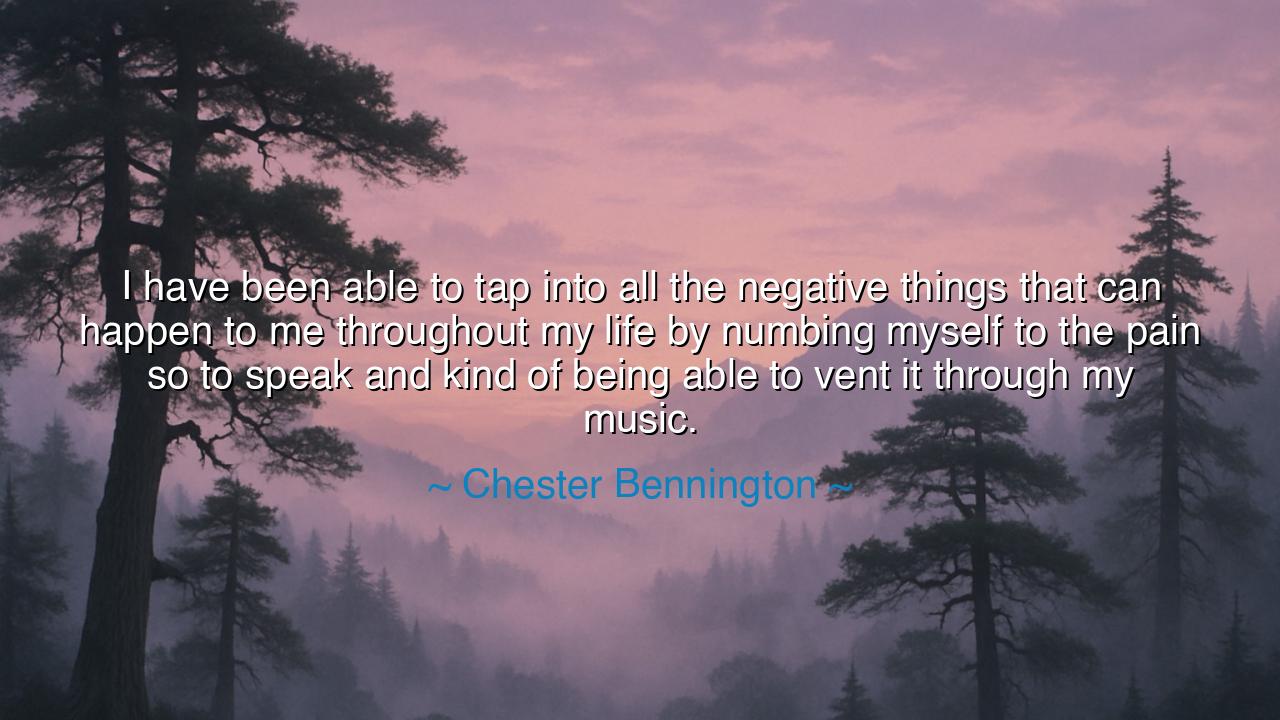
I have been able to tap into all the negative things that can
I have been able to tap into all the negative things that can happen to me throughout my life by numbing myself to the pain so to speak and kind of being able to vent it through my music.






Hear the words of Chester Bennington, a voice of anguish and defiance, who declared: “I have been able to tap into all the negative things that can happen to me throughout my life by numbing myself to the pain so to speak and kind of being able to vent it through my music.” These words speak of a sacred alchemy, where wounds are not buried but transformed, where sorrow is not silenced but reshaped into song. For in the furnace of suffering, Bennington discovered a way to turn despair into strength, torment into testimony, and grief into melody that could heal not only himself but countless others.
The ancients too spoke of such transformation. The Stoics taught that one cannot always choose what fate delivers, but one can choose how to respond. The poet is not free from suffering, but free to shape suffering into beauty. Just as the blacksmith hammers raw iron into the sword, so the artist hammers raw pain into art. Bennington’s words echo this eternal wisdom: that the human soul may either be crushed by negativity, or rise above it by making it serve a higher purpose.
Consider the story of Viktor Frankl, who endured the unspeakable horrors of the concentration camps. Though surrounded by despair, he discovered meaning even in suffering, and later taught the world that man’s spirit can transform agony into purpose. In his own way, Bennington did the same through his music—he channeled trauma, abuse, and inner battles into words and melodies that gave voice to millions who felt voiceless. His scream was not only his own; it was the cry of a generation.
Yet, in his words lies also a confession: he had to “numb” himself to endure. For often, the weight of sorrow is so immense that the heart builds walls, if only to survive another day. This too is a truth the ancients knew. Warriors hardened themselves to battle, not because they felt no fear, but because they had to face it without being destroyed. In this numbness, Bennington found a channel, a doorway to vent the unendurable into something that could be carried by rhythm and voice.
The lesson here is not that we must seek suffering, but that we must not waste it. Every wound, every betrayal, every shadow that falls upon our lives can be either a chain or a tool. If we bury our pain, it poisons us. If we deny it, it festers. But if we face it, if we shape it, if we pour it into creation—whether song, poetry, craft, or even compassion—it becomes a bridge for others, a beacon in their own darkness. This is the wisdom Bennington left behind.
Practical wisdom follows: when you face your own negativity, do not silence it. Instead, find a way to give it form. Write your thoughts, sing your fears, paint your anger, speak your sorrow aloud to those you trust. Transform it, as Bennington did, into something outside of yourself. In doing so, you not only lighten your burden, but you may create something that heals another’s unseen wound.
So let the voice of Chester Bennington resound beyond his life: that pain can be a source of power, that music can be a vessel for survival, that the very things meant to break us can become the seeds of connection. His teaching is both heroic and tender: to suffer is human, but to transform suffering into beauty is divine. Let us, then, not flee from our shadows, but harness them—so that through our own voices, our own works, we too may bring light into the darkness.






AAdministratorAdministrator
Welcome, honored guests. Please leave a comment, we will respond soon